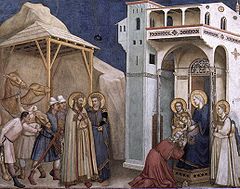
Back Gourdeizioù Breton Vánoční dvanáctidenní Czech Zwölf Weihnachtstage German Δωδεκαήμερο Greek Doce días de Navidad Spanish Božićna osmina Croatian Սուրբ Ծննդյան տասներկու օր Armenian Dua Belas Hari Natal ID Dodici Giorni di Natale Italian クリスマスの12日 Japanese
| Twelve Days of Christmas | |
|---|---|
 The Adoration of the Magi, Fresco at the Lower Church of the Basilica of San Francesco d'Assisi in Assisi, Italy | |
| Observed by | Christians |
| Type | Christian |
| Observances | Varies by denomination, culture, and nation |
| Date | 25 December – 5 January, inclusive |
| Frequency | annual |
| Related to | Christmas Day, Christmastide, Twelfth Night, Epiphany, and Epiphanytide |
The Twelve Days of Christmas, also known as the Twelve Days of Christmastide, are the festive Christian season celebrating the Nativity.
Christmas Day is the First Day. The Twelve Days are 25 December to 5 January, counting first and last. The Octave, or Eighth Day, is New Year's Day and the Feast of the Circumcision, the day Jesus was circumcised according to the Jewish faith. The evening of the last day is Twelfth Night or Epiphany Eve,[1][2] the next morning being Epiphany.
For Christian denominations such as the Anglican Communion or the Lutheran Church, the Twelve Days are identical to Christmastide (December 25 through January 5).[3][4][5] For the Roman Catholic Church, however, Christmastide lasts longer, running through the Feast of the Baptism of the Lord.[6][7] For some, the Twelve Days are considered December 26 to January 6,[8] thus including Epiphany.
- ^ Hatch, Jane M. (1978). The American Book of Days. Wilson. ISBN 9780824205935.
January 5th: Twelfth Night or Epiphany Eve. Twelfth Night, the last evening of the traditional Twelve Days of Christmas, has been observed with festive celebration ever since the Middle Ages.
- ^ Alexander, J. Neil (1 September 2014). Days, Weeks, and Seasons. Church Publishing. ISBN 978-0-89869-874-9.
There are, in fact, twelve days between Christmas Day and the eve of the Epiphany on January 5.
- ^ Bratcher, Dennis (10 October 2014). "The Christmas Season". Christian Resource Institute. Retrieved 20 December 2014.
The Twelve Days of Christmas ... in most of the Western Church are the twelve days from Christmas until the beginning of Epiphany (January 6th; the 12 days count from December 25th until January 5th). In some traditions, the first day of Christmas begins on the evening of December 25th with the following day considered the First Day of Christmas (December 26th). In these traditions, the twelve days begin December 26[th] and include Epiphany on January 6[th].
- ^ Cite error: The named reference
BCPwas invoked but never defined (see the help page). - ^ Truscott, Jeffrey A. Worship. Armour Publishing. p. 103. ISBN 9789814305419.
As with the Easter cycle, churches today celebrate the Christmas cycle in different ways. Practically all Protestants observe Christmas itself, with services on 25 December or the evening before. Anglicans, Lutherans and other churches that use the ecumenical Revised Common Lectionary will likely observe the four Sundays of Advent, maintaining the ancient emphasis on the eschatological (First Sunday), ascetic (Second and Third Sundays), and scriptural/historical (Fourth Sunday). Besides Christmas Eve/Day, they will observe a 12-day season of Christmas from 25 December to 5 January.
- ^ "Christ's baptism ends the Christmas season". Catholic Diocese of Little Rock. 9 January 2022. Retrieved 5 December 2023.
- ^ "Bl. Pope Paul VI, Universal Norms on the Liturgical Year, #33 (14 February 1969)" (PDF).
- ^ Blackburn, Bonnie J. (1999). The Oxford companion to the year. Holford-Strevens, Leofranc. Oxford. ISBN 0-19-214231-3. OCLC 41834121.
{{cite book}}: CS1 maint: location missing publisher (link)